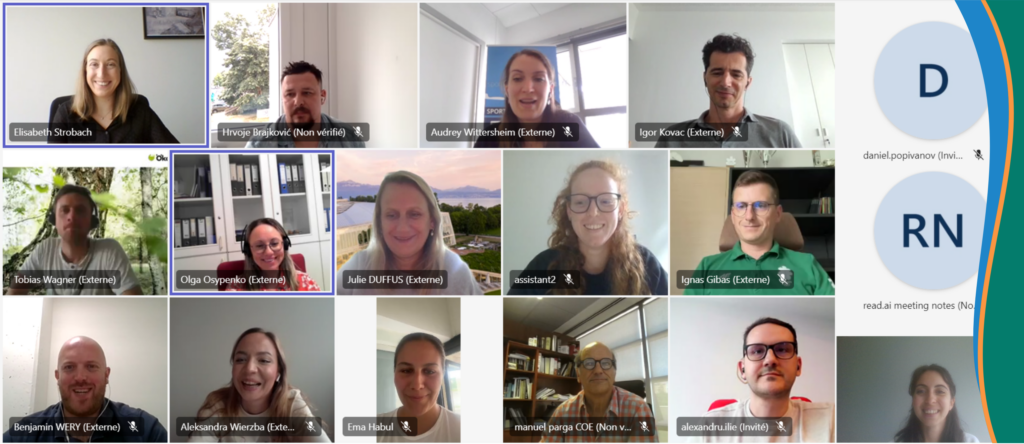The 4th Consortium Call took place on 2nd July. The EOC EU Office organised this online conference to set up a feedback session on the various actions that have been implemented since the third Consortium Call in January and to give a summary of the tasks that would be coming up.
The 18 NOCs received feedback from the Öko-Institut on the carbon footprint results and the upcoming tool. The OCEAN management team presented its approach to help Climate Action Officers obtain support from their leadership and NOC president in implementing their carbon footprint reduction strategy.
The Consortium will meet again after the Games with many meetings planned before the end of 2024. The second peer to peer roundtable on reduction strategies will be held online on 17September, followed by the Module 4 of the Training Course and the EOC Seminar. The consortium will meet again in Prague for the second Project Meeting and Module 5 of the Training Course in December. A webinar for NOCs Presidents, a workshop on the Pool of Actions and bilateral calls will also be organised before the end of 2024.
In the meantime, Climate Action Officers have been asked to continue drafting their carbon footprint reduction strategies, the adoption of which is scheduled for Spring 2025.

On 18 June, the OCEAN Project Consortium gathered online for the first peer-to-peer roundtable.
Climate Action Officers presented the state of their carbon footprint reduction strategy. This collaborative opportunity aimed to draw inspiration from others and get feedback from peers to move forward in this process. This session highlighted the common challenges faced by the NOCs and raised awareness of the range of measures that can be implemented at national level.
Congratulations to the 18 NOCs for their progress and commitment to reducing sport's carbon footprint. A second roundtable will be held in September.

On 22 February, 18 National Olympic Committees, the European Olympic Committees EU Office (EOC EU Office), the International Olympic Committee (IOC) and the Association of National Olympic Committees (ANOC) gathered in Brussels for the Kick-Off Meeting of the OCEAN Project.
OCEAN, which stands for “Olympic Committees of Europe Approaching Carbon Neutrality”, aims to empower National Olympic Committees (NOCs) to measure and reduce their carbon footprint and enhance good governance in the field of climate action within their NOCs. In order to assist NOCs in getting as near to carbon neutral as possible, the project seeks to create and offer training for "Climate Action Officers." Subsequently, the project's main objective is to assist partner NOCs in creating a customised strategy for carbon reduction following an assessment of their carbon footprint with the support of the German environmental research institute Öko-Institut.
The Kick-Off Meeting, on 22 February, was opened by EOC President Spyros Capralos, who highlighted the relevance of the OCEAN Project and the responsibility of the sports organisations to reduce their impact on the environment and take up the sport world’s responsibility to lead by example in the field of climate action.
A key theme throughout the newly-adopted EOC Strategic Agenda 2030 is sustainability. In his opening speech, President Capralos praised the project’s partners for showing that Europe as a continent is serious about taking climate action.
He said: “It is incredibly pleasing to see the attendance here today. It is a sign that we are all taking climate change seriously. It is a sign that we are all committed to tackling the issue.
“We must adapt to the new realities we are facing. We must make sure that as a movement our organisations and events are agile enough to respond to the challenges that come our way.”
“The mission of the Olympic Movement is ‘to make the world a better place through sport‘. So as well as being able to manage the risks and adapt, we also have a responsibility to help solve the world’s biggest challenges. There is no doubt that climate change is definitely one of them.”
“And there are two ways in which we can have a big impact on the environment. We must reduce the negative impact of the European Olympic Movement’s activities on climate and we must also use the power of the Olympic Movement to inspire others into taking positive action.”
Folker Hellmund, Director of the EOC EU Office, stated: “This project funded by the European Union will empower European NOCs by providing the necessary tools and skills to embark on the climate action journey. But the impact of the project will be global and eventually strengthen good governance in the field of climate action for sport organisations”.
